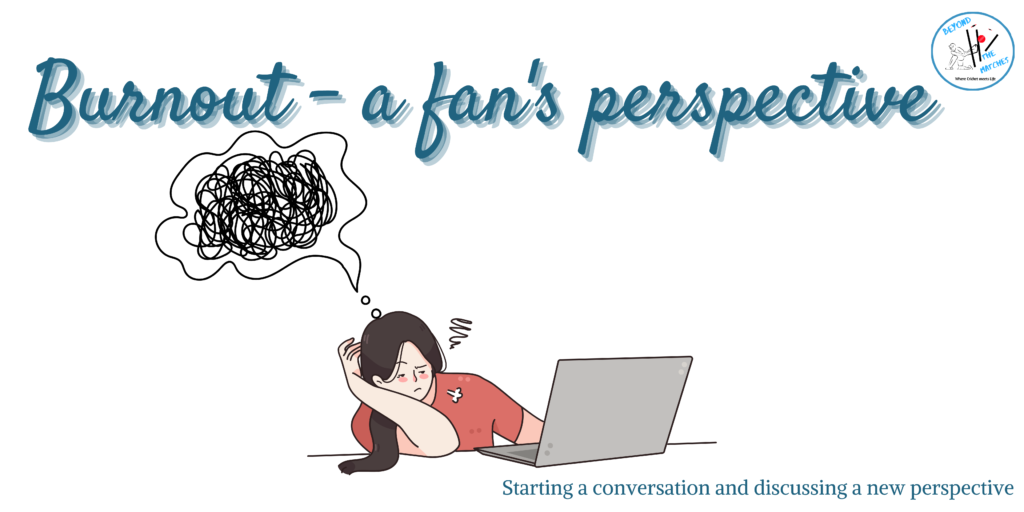Please note: We know that as fans, we connect to sport differently and in no way, under no circumstances does this blog encourage that you should not watch sports or that it has a negative impact on us. That being said, we cannot step back from discussing and starting a conversation about how fan’s mental health and emotional health is affected from it and how we can better that for ourselves. This blog is an attempt to lead the conversation around the same.
*The current blog was written keeping the games from India tour of Australia 2020-2021 to IPL 2022 in consideration.

We have heard and read about how athletes experience burnout. Though, a lot more awareness and conversations need to be held in order to reduce its impact and support the athlete to perform better and rest well at the same time.
A little less explored aspect of burnout in sports according to me, is the one experienced by the fans. While there may not be much research backed information in the current blog, this one is written purely from the experiences of the author, interactions with fans and understanding how too much sports and frequent losses of the team one roots for, affects the fan’s interest and engagement in viewing and enjoying the game. This in no way means the team is supposed to win always but throws a light on how invested the fans are in the team’s journey.
I have read quite a few times how sports in general and back-to-back games in particular make it difficult for fans to maintain the same level of enthusiasm. Before learning more about the burnout that fans go through, let us first understand burnout.
Quick guide:
Burnout
Athletic Burnout
Athlete burnout is defined as a psychological syndrome characterized by emotional and physical tiredness, a diminished sense of accomplishment, and sport devaluation, according to the most frequently accepted description. Athletes that are experiencing burnout may be emotionally fatigued as a result of the constant stress of competition, training, and other time demands (work, school).
Another important aspect in burnout is a diminished sense of accomplishment, which causes athletes to question and mistrust their sport talents and capacity to succeed. They may believe they are working hard yet making little progress toward their objectives.
Read more on Athlete Burnout :
https://psychology.iresearchnet.com/health-psychology-research/psychophysiology/burnout-in-sport/
Audience Burnout – a food for thought
This may not be a proper term to address the thought of how fans experience burnout and/or fatigue being consumers of a particular sport. Fans have as much emotional investment in the sport as the athlete.
Drawing parallels from the definition of athlete burnout, one can look back on their individual journeys as fans i.e., how did you feel when your favorite player/team lost a few games in a row? How did you feel when there were too many games being played at the same time and you could not keep up with it?
Fans contribute a lot to the sport and there is no turning away from it. However, what happens when the fans slowly stop engaging with the same enthusiasm and passion? Rightly, the engagement rate starts falling.
Recently, a lot of fans stepped back from watching games live, would complain about not having energy left or just feeling tired about watching a game, a silent observation was made that somewhere the fans were feeling tired mentally and emotionally. Many fan engagements on social media eventually decreased from lengthy discussions to brief exchanges of words, and merely the comfort of engaging in a live game with online friends remained somewhat comforting.
Even though other environmental and social factors would have contributed to their lack of engagement, we can only speculate as to how our energies are being distributed and channeled when those factors are taken into account, along with the fact that we are not just spectators of the sport but also have our own personal stressors and responsibilities to manage alongside it.
Somewhere, we need to realize and be aware of “how much is too much” for ourselves in order to avoid experiencing phases of burnout/disengagement from watching the sport we love.
Fan’s perspective
I would like to draw on my own experience as someone who watched the Olympics, other events, and all cricket matches live after the lockdown. I did not initially recognize how much of my emotional and mental strength was being channeled into simply watching the game since the prospect of being able to watch the matches for an extended period of time and experiencing the emotions in their raw form was so exciting.
In addition to watching the game live with my friends online, I used to write blogs, edit them, and live tweet on Beyond the Matches’ social media platforms. Though I used to study, work, and maintain my sleep pattern through it all, months passed and eventually it began to seem overwhelming.
I would keep staring at the screen with the match playing in background and would find myself zoning out every now and then. I was not being my same self as a fan after a point. The issue was not the games were being played back-to-back only but it was more about what and how I was investing into watching it, writing about it and what I used to do in the other times when the games were off.
While I did have a good time management technique to practice under my sleeves, what I did not do right was to manage my viewing hours and choosing which games to watch entirely and when to take breaks. Its only when I started losing interest in watching games despite my team winning that my concern for my own thought process started to rise.
I was not affected by the results, I was hardly registering the game but because I love watching sports, I would have multiple tabs on, different apps to follow the games that were not live streamed and not missing out on any match to my best ability.
I slowly began to feel exhausted, and the best option out of it was to take a break. I asked some of the other cricket enthusiasts if they had experienced the same thing and, I was surprised to see that many of us shared that same feeling.
Because of the schedule that was in place and our desire to watch the games no matter what, many of us even though were not losing interest in the game, we were feeling overpowered by the constant rush of emotions. Since we were living in survival mode throughout the pandemic, the stresses of daily life would amplify the emotional stress.
Management
After talking to several others around, wondering how I can handle it, and doing some research on my own, I found the following to be beneficial as a fan to not feel burned out or overwhelmed and to avoid experiencing ‘viewer burnout’ as a sports fan. These include:
After a particularly stressful game, one should actively choose to read written commentary and check the scoreboard for the next few games.
Resist the impulse to watch every game live at once and limit your viewing to two or three games at the most. Pushing yourself above your limits may seem wonderful at the time because of the adrenaline, but it will eventually wear you out and be unproductive.
Refrain from offering post-game critique right away. Take a day or at least a few hours. Let the happenings of the game you enjoyed/experienced watching, sink in.
The fourth and most crucial tip—which receives less attention—is to take breaks. It is crucial to occasionally switch your attention from one sport to another or to an activity completely unrelated to sports. It aids in keeping you engaged in the game, prevents you from becoming exhausted by its constant presence, and keeps you inspired to watch them with the same excitement.
There are numerous approaches that can be taken, each one being unique to the individual. These are some common ones that I have found to be helpful, and might also be helpful to anyone else reading this. Feel free to share any more strategies you may have that have been useful with us in the comments section below.
~ Urvi Shah (Author, Beyond the Matches)
Follow us on socials: Twitter: @beyondmatches || Facebook: Beyond the Matches || Instagram: @beyondthematches
Check out and subscribe to our YouTube channel : Beyond the Matches
